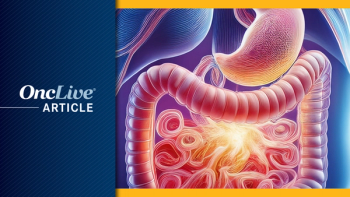
Selecting Perioperative Therapy in Gastric/GEJ Cancer
Transcript:
Manish Shah, MD: The approach for perioperative therapy is complex. I think that’s one of the main questions that my Fellows, and even other physicians, come to me about in terms of how we treat this. I would begin by saying that there is not one dogmatic, correct answer. I have many colleagues in Europe, where for distal esophageal cancers and proximal GE junction tumors, the preferred approach is chemotherapy and not chemoradiation, which is what we tend to do here. For many people regarding distal gastric cancer, even at very elite centers, they prefer to do neoadjuvant chemoradiation instead of perioperative chemotherapy or postoperative chemoradiation. I would begin by saying that there isn’t one dogmatic, standard approach for everybody.
That being said, in gastric cancer, for most patients who are locally advanced—and by that, I mean T3 or greater by ultrasound or node positive—my preferred approach would be perioperative chemotherapy. If they’re quite robust, I would really try to use the FLOT regimen based on Al-Batran’s FLOT4 study. But most patients are really getting a platinum and 5-FU [fluorouracil] in the perioperative setting. We are, in fact, studying the addition of pembrolizumab in this setting, and that’s being tested in a registration trial internationally.
For GE junction tumors, I think that’s where the differences are most wide. In my practice, for proximal GE junction tumors, where the surgical anastomosis could be high in the neck, I really am more inclined to use neoadjuvant chemoradiation. It’s hard to come back with radiation in a postoperative setting when the anastomosis is high because the field for radiation is really high. For most GE junction type 1 tumors, I certainly use chemoradiation as the neoadjuvant approach. For most GE junction type 3 tumors, which are really gastric cardia tumors, I treat them more like gastric cancer, so that narrows the GE junction to type 2 tumors.
For those patients, I really think that both chemoradiation and chemotherapy in the perioperative setting give similar benefit. I think that’s where the multidisciplinary clinic helps a lot. In our clinic, we have both thoracic surgery and general surgery, so we are able to discuss the surgical nuances that may play a role and whether we should use a chemoradiation approach. And then the patients play a role as well, in thinking about what they want to do. Some patients really don’t want the radiation. Some surgeons don’t like radiation. Alternatively, sometimes patients and physicians prefer radiation.
The question about adjuvant therapy comes up sometimes. If we identify patients as locally advanced, we prefer a perioperative approach. About 30% of patients just don’t recover well enough from a gastrectomy to receive adjuvant therapy, so that’s one main reason that a perioperative approach might be better. But if someone had surgery and locally advanced disease, then the question of adjuvant therapy comes into play. There are 2 main standard options. The standard option that I think is preferred in the West is chemotherapy and radiation. That’s based on Macdonald’s study. That’s already 2 decades old.
The data from the East, Korea and Japan, look at adjuvant chemotherapy. That can be an option as well, but I look closely at the patient population. In the West, the patients were more Caucasian, were more obese, had more comorbidities, and had survival outcomes similar to my patient population. I’m more inclined to use chemoradiation. There may be some patients who are new immigrants from Asia for whom I prefer chemotherapy. There are patients who won’t tolerate chemoradiation. In that group, I use chemotherapy as well.
Transcript Edited for Clarity



































